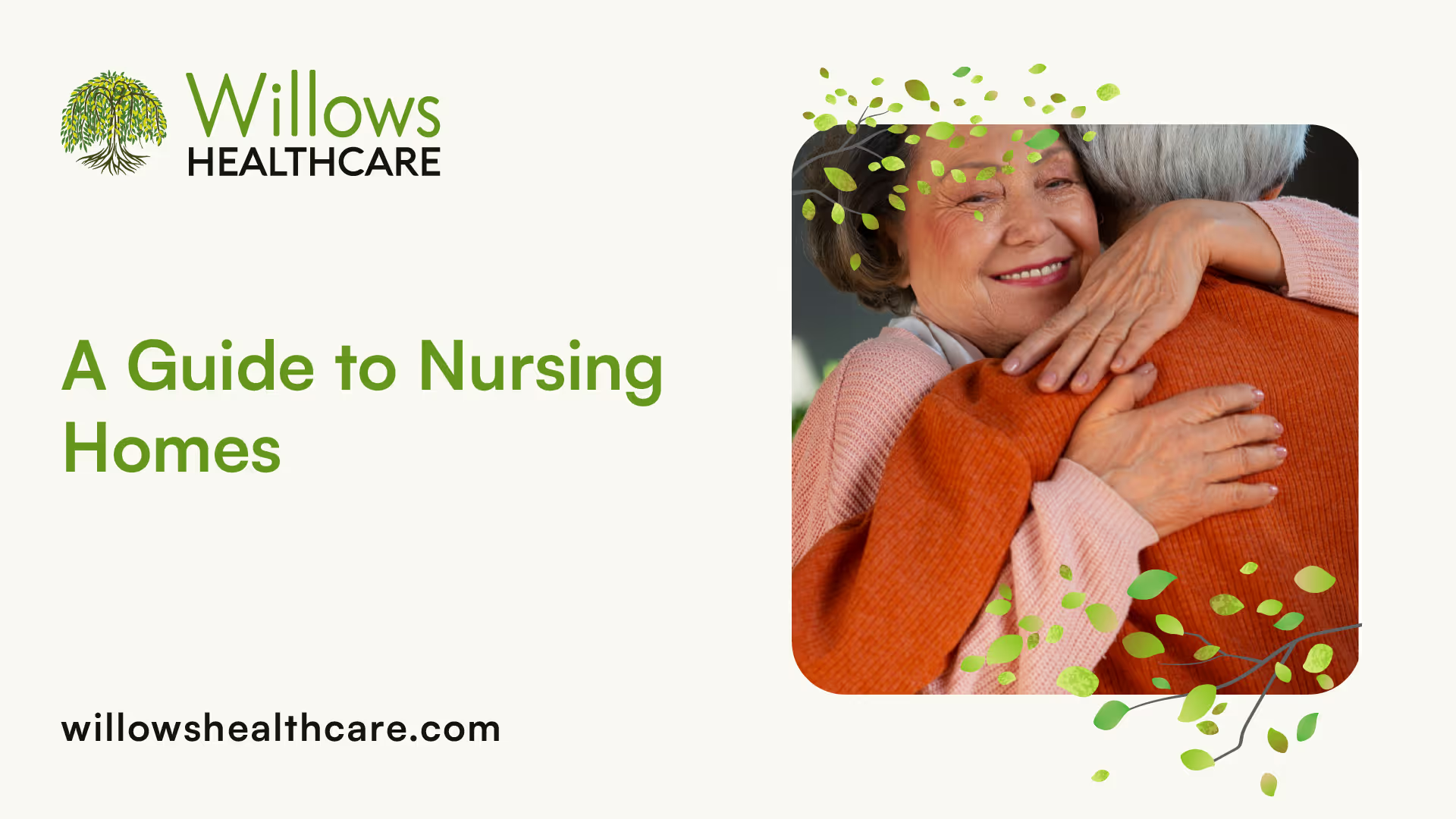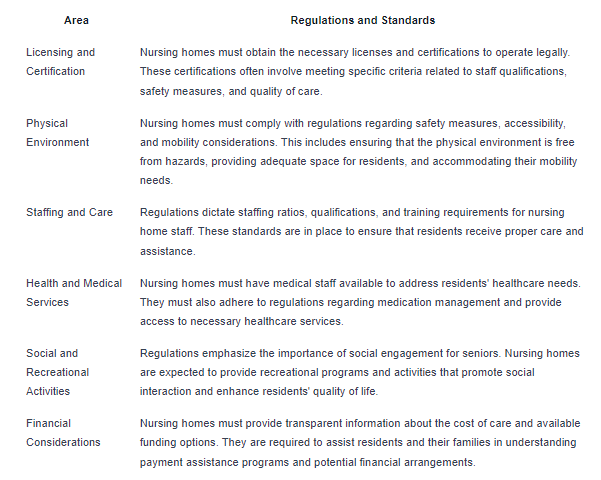A Guide to Nursing Homes
March 18, 2025
Discover the essential nursing home requirements for seniors. From safety measures to social engagement, ensure a safe haven for your loved ones.



Understanding Nursing Home Requirements
Ensuring that nursing homes meet specific requirements is essential for providing a safe and supportive environment for seniors. These requirements encompass various aspects, including the physical environment, staffing and care, health and medical services, social and recreational activities, as well as financial considerations. Let's explore the importance of meeting nursing home requirements and the regulations and standards that govern senior care facilities.
Importance of Meeting Nursing Home Requirements
Meeting nursing home requirements is crucial in promoting the well-being and quality of life for seniors. These requirements are designed to safeguard the physical and emotional health of residents, ensuring that they receive appropriate care and support. By complying with these standards, nursing homes can provide a safe haven where seniors can thrive and receive the care they need.
Adhering to nursing home requirements also helps to protect residents from potential risks, such as accidents, abuse, and neglect. It establishes a framework that promotes accountability, transparency, and quality of care. Meeting these requirements not only ensures the safety and well-being of seniors but also provides peace of mind for their families and loved ones.
Regulations and Standards for Senior Care Facilities
Senior care facilities, including nursing homes, are subject to regulations and standards set by government agencies and industry organizations. These regulations aim to establish guidelines and expectations for the operation and management of nursing homes. Let's take a look at some key areas covered by these regulations and standards:

Meeting nursing home requirements is a vital aspect of providing a safe and nurturing environment for seniors. By adhering to regulations and standards, nursing homes can ensure that residents receive the care and support they deserve, promoting their overall well-being and enhancing their quality of life.

Physical Environment Standards
Ensuring a safe and comfortable living environment is a crucial aspect of meeting nursing home requirements for seniors. Nursing homes must adhere to specific standards to provide a secure and accessible space for residents. This section will explore two key aspects of physical environment standards: safety measures and accessibility and mobility considerations.
Safety Measures in Place
Nursing homes are required to implement various safety measures to protect the well-being of their residents. These measures include:
- Emergency Preparedness: Nursing homes must have well-defined emergency plans in place to handle situations such as fires, natural disasters, and medical emergencies. Regular drills and staff training are essential to ensure that everyone knows their roles and responsibilities during emergencies.
- Fall Prevention: Falls are a common concern among seniors, and nursing homes must take appropriate measures to minimize the risk of falls. This includes installing handrails and grab bars in bathrooms and hallways, providing non-slip flooring, and conducting regular assessments of residents' mobility and balance.
- Fire Safety: Nursing homes must comply with fire safety regulations, including the installation of smoke detectors, fire alarms, and fire extinguishers. Regular inspections and maintenance of fire safety equipment are essential to ensure a safe environment for residents.
- Security Measures: Nursing homes should have proper security measures in place to protect residents from unauthorized access and ensure their safety. This may include controlled entrances, surveillance systems, and trained security personnel.
Accessibility and Mobility Considerations
To meet the needs of seniors with varying mobility levels, nursing homes must prioritize accessibility within their physical environment. Some key considerations include:
- Wheelchair Accessibility: Nursing homes should have ramps or elevators to provide wheelchair accessibility to different areas of the facility. Doorways, hallways, and common areas should be wide enough to accommodate wheelchairs and other mobility aids.
- Bathroom Accessibility: Bathrooms should have grab bars, raised toilet seats, and roll-in showers to ensure that seniors with mobility challenges can safely and independently use these facilities.
- Accessible Common Areas: Common areas such as dining rooms, lounges, and activity rooms should be designed with accessibility in mind. This includes ensuring adequate space for maneuvering mobility devices and providing comfortable seating options for seniors with different needs.
- Handicap Parking: Nursing homes should have designated handicap parking spaces close to the entrance to facilitate easy access for residents with mobility limitations.
By adhering to these physical environment standards, nursing homes can provide a safe and inclusive living space for seniors. Creating an environment that promotes safety, accessibility, and mobility not only ensures the well-being of residents but also enhances their overall quality of life.

Staffing and Care Requirements
Ensuring that nursing homes meet staffing and care requirements is essential for providing quality care and support to seniors. The staff-to-resident ratio and the qualifications of the staff play a crucial role in maintaining a safe and nurturing environment. Additionally, ongoing training and education for staff members are vital to keep up with the evolving needs of the residents.
Staffing Ratios and Qualifications
Maintaining appropriate staffing ratios is fundamental to meet the needs of residents in nursing homes. These ratios determine the number of staff members available to care for the residents. While specific requirements may vary by location, here is a general overview of staffing ratios for nursing homes:

It's important to note that these ratios are approximate and can vary based on state regulations and the level of care required by the residents. Additionally, nursing homes may employ additional staff members, such as social workers, therapists, and administrative personnel, to meet the diverse needs of the residents.
In terms of qualifications, nursing homes typically require staff members to have appropriate certifications and licenses. Registered Nurses (RNs) are responsible for overseeing medical care and must hold a valid nursing license. Licensed Practical/Vocational Nurses (LPN/LVN) provide basic nursing care and must also have the necessary licenses. Certified Nursing Assistants (CNAs) assist with daily activities and personal care and must complete state-approved training programs and obtain certification.
Training and Continuing Education for Staff
To provide the best possible care to seniors, nursing home staff members must receive comprehensive training and have access to continuing education opportunities. This ensures that they stay updated on the latest practices and techniques in senior care. Training and education cover a range of topics, including:
- Basic caregiving skills
- Safety and emergency procedures
- Infection control protocols
- Communication and interpersonal skills
- Dementia care and behavioral management
- Medication administration and management
By investing in ongoing training, nursing homes can enhance the skills and knowledge of their staff, leading to improved resident care and satisfaction.
Continuing education programs also play a crucial role in keeping staff members informed about advancements in senior care. These programs may include workshops, conferences, online courses, and seminars. By participating in continuing education, staff members can stay abreast of new research, best practices, and emerging trends in the field of senior care.
Nursing homes that prioritize staffing ratios, qualifications, and ongoing training and education create an environment that promotes the well-being and safety of seniors. By ensuring that staff members are well-equipped and knowledgeable, nursing homes can provide the highest quality of care to their residents.
Health and Medical Services
Ensuring the health and well-being of seniors in nursing homes is of paramount importance. Meeting the health and medical service requirements is crucial for providing comprehensive care. This section will explore two key aspects: medical staff availability and medication management.
Medical Staff Availability
One of the essential nursing home requirements is the availability of medical staff to address the healthcare needs of residents. Having qualified healthcare professionals on-site is crucial for timely assessment, diagnosis, and treatment of medical conditions. These professionals may include:
- Physicians: Physicians play a vital role in managing the overall health of seniors in nursing homes. They conduct regular medical assessments, prescribe medications, and coordinate with other healthcare providers.
- Registered Nurses (RNs): Registered nurses provide skilled nursing care, administer medications, monitor vital signs, and ensure proper wound care. They also liaise with physicians and other healthcare professionals to ensure comprehensive care.
- Licensed Practical Nurses (LPNs) or Licensed Vocational Nurses (LVNs): LPNs/LVNs assist with basic medical care, administer medications, and monitor residents' health status under the supervision of registered nurses or physicians.
- Certified Nursing Assistants (CNAs): CNAs provide hands-on care, assisting with activities of daily living, such as bathing, dressing, and feeding. They also help with mobility and provide emotional support to residents.
Having an adequate number of medical staff members is crucial to meet the healthcare needs of residents effectively. Nursing homes typically have specific staffing ratios and qualifications mandated by regulations to ensure sufficient coverage and expertise.
Medication Management and Healthcare Services
Proper medication management is vital in nursing homes to ensure the safe and accurate administration of medications. Nursing home staff should follow stringent protocols to prevent medication errors and adverse drug reactions. This includes:
- Medication Administration: Trained staff members should administer medications according to prescribed schedules and dosage instructions. They should document medication administration accurately and promptly.
- Medication Monitoring: Regular monitoring of residents' medication responses and potential side effects is essential. Medical staff should promptly address any concerns or adverse reactions and communicate with physicians when necessary.
- Medication Reconciliation: When residents transition into a nursing home, a comprehensive medication reconciliation process should be conducted. This ensures that the resident's current medication list is accurate and up to date.
- Healthcare Services: Nursing homes should have arrangements with external healthcare providers to ensure residents have access to necessary medical services. This may include specialists, physical therapists, occupational therapists, and other healthcare professionals.
To ensure compliance with nursing home requirements, facilities must have established policies and procedures for medication management and healthcare services. Staff should receive appropriate training to ensure they are knowledgeable and competent in these areas.
By meeting the health and medical service requirements, nursing homes can provide residents with the necessary care and attention to maintain their health and well-being. The availability of qualified medical staff and effective medication management protocols contribute to a safe and supportive environment for seniors in nursing homes.
Social and Recreational Activities
Ensuring a fulfilling and enjoyable experience for seniors in nursing homes goes beyond meeting their physical and medical needs. Social and recreational activities play a vital role in promoting well-being and quality of life. In this section, we will explore the importance of social engagement and the availability of recreational programs and activities for seniors in nursing homes.
Importance of Social Engagement
Social engagement is a crucial aspect of seniors' overall well-being. Meaningful interactions and connections with others can have a positive impact on their mental, emotional, and physical health. Nursing homes recognize the significance of social engagement and strive to create an environment that fosters social interaction and a sense of community.
By providing opportunities for seniors to engage in social activities, nursing homes aim to reduce feelings of isolation and loneliness. Social engagement can enhance cognitive function, boost mood, and improve overall mental well-being. It also creates a support system among residents and helps them build lasting friendships.
Recreational Programs and Activities for Seniors
Nursing homes offer a variety of recreational programs and activities tailored to the interests and abilities of their residents. These activities aim to promote physical fitness, mental stimulation, creativity, and socialization. The availability of such programs ensures that seniors can actively participate and enjoy their time in the nursing home.
Here are some examples of recreational programs and activities commonly provided in nursing homes:

These activities are designed to cater to a wide range of interests and abilities, ensuring that there is something enjoyable and engaging for everyone. Nursing homes often have dedicated staff members who plan and facilitate these programs, ensuring that they are well-suited to the needs and preferences of the residents.
By providing a variety of recreational programs and activities, nursing homes create an environment that encourages seniors to stay active, engaged, and connected. These activities contribute to a sense of purpose, happiness, and overall well-being among the residents, enhancing their experience in the nursing home setting.
Financial Considerations
When it comes to nursing home care for seniors, financial considerations play a significant role in the decision-making process. It's important to understand the cost of care in nursing homes and the available funding options and payment assistance programs.
Cost of Care in Nursing Homes
The cost of care in nursing homes can vary depending on several factors, including the location, level of care required, and the amenities provided. On average, the cost of a private room in a nursing home in the United States is around $8,000 per month, with costs ranging from $5,000 to $10,000 or more.
To give you a better idea of the average costs, here is a breakdown of the national average costs for nursing home care:
Type of RoomAverage Monthly CostPrivate Room$8,000Semi-Private Room$7,000
It's important to note that these costs are only estimates, and actual costs can vary based on the factors mentioned earlier. It's recommended to research and inquire about the specific costs at the nursing homes you are considering.
Funding Options and Payment Assistance
Considering the high cost of nursing home care, it's essential to explore funding options and payment assistance programs that can help alleviate the financial burden. Here are some common funding options and payment assistance programs available:
- Medicare: Medicare is a federal health insurance program that covers certain services in nursing homes for a limited time, typically following a hospital stay. However, it does not cover long-term care in nursing homes.
- Medicaid: Medicaid is a joint federal and state program that provides health coverage for individuals with limited income and resources. Medicaid can cover the cost of nursing home care for eligible individuals.
- Long-Term Care Insurance: Long-term care insurance is a policy that helps cover the costs of long-term care services, including nursing home care. It's important to note that coverage and eligibility criteria vary depending on the specific policy.
- Veterans Benefits: Veterans and their spouses may be eligible for benefits through the Department of Veterans Affairs (VA) for nursing home care. The Aid and Attendance Pension Benefit is one such program that provides financial assistance.
- Personal Savings and Assets: Some individuals may choose to use their personal savings or assets, such as retirement funds or the sale of property, to cover the cost of nursing home care. It's important to consult with a financial advisor to assess the impact on long-term financial stability.
- State and Local Programs: Some states and local communities offer programs that provide financial assistance or subsidies for nursing home care. These programs may have specific eligibility criteria and application processes.
It's crucial to thoroughly research and understand the eligibility requirements, coverage, and limitations of these funding options and payment assistance programs. Consulting with a financial advisor or elder law attorney can provide valuable guidance and help navigate the complexities of financing nursing home care.
By considering the financial aspects of nursing home care, individuals and families can make informed decisions and explore the available options to ensure the best possible care for their loved ones.
Sources
https://www.aplaceformom.com/caregiver-resources/articles/nursing-home-checklist
https://health.usnews.com/senior-care/articles/nursing-home-requirements
https://www.helpguide.org/aging/healthy-aging/nursing-homes-guide













